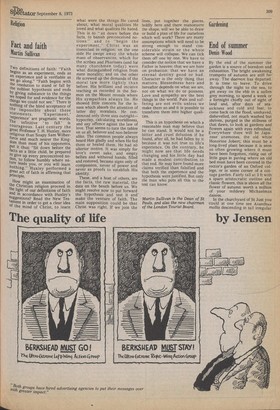Religion
Fact and faith
Martin Sullivan
Two definitions of faith: "Faith begins as an experiment, ends as an experience and is verifiable as we go along." "Faith begins with the resolution to stand or fall by the noblest hypothesis and ends by giving substance to the things we hoped for and evidence for the things we could not see." There is nothing of the blind acceptance of the impossible about these statements. 'Experiment,' experience' are pragmatic words, The infinitive to fall ' is courageous. Last century the great Professor T. H. Huxley, more religious than Soapy Sam Wilberforce and much nearer the Kingdom than most of his opponents, put it thus: "Sit down before the facts as a little child, be prepared to give up every preconceived notion, to follow humbly where nature leads you, or you will learn nothing." Huxley performed a great act of faith in affirming that Principle.
How might an examination of the Christian religion proceed in the light of our definitions of faith and in accordance with Huxley's suggestions? Read the New Testament in order to get a clear idea of the mind of Christ, to learn
what were the things He cared about, what moral qualities He loved and what qualities He hated. This is to "sit down before the facts, to banish preconceived notions" and to "begin the experiment." Christ was an iconoclast in religion; on the one side He swept away the whole mass of observances, which for the scribes and Pharisees (and for many churchmen today) were what distinguished religion from mere morality; and on the other He screwed up the demands of the moral law more tightly than before. His brilliant and incisive teaching as recorded in the Sermon on the Mount reveals where His sympathies always lie. He showed little concern for the issues which absorb the attention of latter day moralists. He condemned only three sins outright hypocrisy, calculating worldliness, and any offence aginst the law of love. That seems to turn the tables on us all, believer and non-believer alike. The common people always heard Him gladly and when He fed them or healed them, He had nb ulterior motive. It was simply for love's sweet sake, and empty bellies and withered hands, filled and restored, became signs only of compassion, never of power and never as proofs to establish His identity.
These, and a host of others, are the facts, the raw material, the data on the bench before us. We might resolve now to put forward the hypothesis and test it and make the venture of faith. The main supposition could be that Christ was right. If we join the lines, put together the pieces, boldly here and there manoeuvre the shape, will we be able to draw or build a plan of life for ourselves which will work? There are many assumptions which will need to be strong enough to stand considerable strain or the whole scheme will collapse. We can tick them off one by one. We have to consider the notion that we have a Father in heaven: that we are here on probation: that we have an eternal destiny good or bad. Character is the only thing that matters. Blessedness here and hereafter depends on what we are, not on what we do or possess. Love and sympathy are the best things in the world. Pain and suffering are not evils unless we make them so and it is possible to transform them into higher qualities.
This is an hypothesis on which a reasonable man may believe that he can stand. It would not be a bitter and cruel delusion if he found, after all, he had fallen by it because it was not true to life's experience. On the contrary, he might now see that life needs changing and his little day had made a modest contribution to that end. He may have found more claims verified than falsified and that both the experience and the hypothesis were justified. But only the man who puts all this to the test can know.
Martin Sullivan is the Dean.of St Pouts, and also the new chairman of the London Tourist Board.


































 Previous page
Previous page